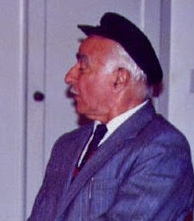
Back چوزو توماسيڤيتش ARZ Jozo Tomasevich Spanish Jozo Tomasevich French Jozo Tomašević Croatian Jozo Tomasevich Portuguese Томашевич, Йозо Russian Jozo Tomašević Serbo-Croatian Јозо Томашевић Serbian Йозо Томашевич Ukrainian
Jozo Tomasevich | |
|---|---|
Josip Tomašević | |
 | |
| Born | 1908 |
| Died | October 15, 1994 (aged 86) |
| Citizenship | United States |
| Alma mater | University of BaselHarvard University |
| Known for | War and Revolution in Yugoslavia 1941–1945 |
| Spouse | Neda Brelić (m. 1937) |
| Children | 3 |
| Awards | Award for Distinguished Contributions to Slavic Studies (1989) |
| Scientific career | |
| Fields | EconomicsHistory |
| Institutions | San Francisco State UniversityStanford UniversityColumbia UniversityFederal Reserve BankBoard of Economic WarfareUnited Nations Relief and Rehabilitation AdministrationNational Bank of Yugoslavia |
Josip "Jozo" Tomasevich (1908 – October 15, 1994; Serbo-Croatian: Josip Tomašević) was an American economist and historian whose speciality was the economic and social history of Yugoslavia. Tomasevich was born in the Kingdom of Dalmatia, then part of Austria-Hungary, and after completing high school and attending a commercial academy, he earned a doctorate in economics from the University of Basel in Switzerland. In the mid-1930s, he worked at the National Bank of Yugoslavia in Belgrade and published three well-received books on Yugoslavia's national debt, fiscal policy, and money and credit respectively.
In 1938, he moved to the United States as the recipient of a two-year Rockefeller fellowship and conducted research at Harvard University before joining the academic staff of Stanford University. During World War II, Tomasevich worked for the Board of Economic Warfare and the United Nations Relief and Rehabilitation Administration, and post-war he joined the Federal Reserve Bank in San Francisco. In 1948, he joined the staff at San Francisco State College (later San Francisco State University). He combined research and teaching there for twenty-five years until his retirement in 1973, which was broken by a year of teaching at Columbia University in 1954. Between 1943 and 1955, Tomasevich published two positively reviewed books on economic matters; one focused on marine resources and the other on the peasant economy of Yugoslavia.
Tomasevich then embarked on an extensive research and writing project on Yugoslavia in World War II – War and Revolution in Yugoslavia 1941–1945 – which was planned to consist of three volumes. Supported by grants and fellowships, he published the first volume titled The Chetniks in 1975, which explored the development and fate of the Chetnik movement during the war. The book was well received, and twenty-five years later was described by the Yugoslav and Croatian historian Ivo Goldstein as still the "most complete and best book about the Chetniks to be published either abroad or in former Yugoslavia". After his retirement he was appointed professor emeritus of economics at San Francisco State University, and he died in California in 1994.
His final book was the second volume of the series – War and Revolution in Yugoslavia 1941–1945: Occupation and Collaboration – which was edited by his daughter Neda Tomasevich then published posthumously in 2001. It focused on collaboration and the quisling governments in Yugoslavia during the war with a strong emphasis on the Independent State of Croatia, an Axis puppet state. The book was highly praised by historians. The third volume on the Yugoslav Partisans remains unpublished despite being 75 per cent complete at his death. The scholarly standard Tomasevich achieved with the first two volumes in the series made his death before completing the series "a tragedy keenly felt even by those who never knew him", according to Klaus Schmider, a Royal Military Academy Sandhurst lecturer and German historian. In his obituary by Alexander Vucinich in the Slavic Review, Tomasevich was described as "a master of scholarly skills, a person of bountiful erudition, wit and human dignity".